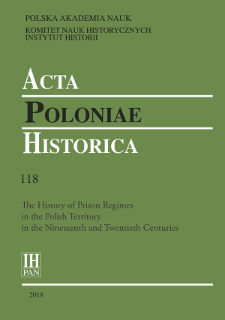- Search in all Repository
- Literature and maps
- Archeology
- Mills database
- Natural sciences
Advanced search
Advanced search
Advanced search
Advanced search
Advanced search

Object
Title: Political Prisoners in Poland, 1944–56 : the Sources and Strategies of Resistance in the Authoritarian State’s Prison System
Subtitle:
The History of Prison Regimes in the Polish Territory in the Nineteeth and Twentieth Centuries ; Acta Poloniae Historica T. 118 (2018)
Contributor:
Instytut Historii Polskiej Akademii Nauk ; Komitet Nauk Historycznych Polskiej Akademii Nauk ; Korecki, Tristan : Tł.
Publisher:
Instytut Historii im. Tadeusza Manteuffla Polskiej Akademii Nauk
Place of publishing:
Description:
Type of object:
Abstract:
This article seeks to reconstruct the resistance attitudes and strategies of survival among political prisoners in Poland in the years 1944–56, referred to as the Stalinist period. The introductory section reviews the literature on social resistance in authoritarian political systems, including Poland and covering political prisoners. Subsequently, a definition of ‘political prisoner’ is proposed and the socio-political context of the Stalinist period presented, in which prisons were assigned a strictly repressive function. The present analysis primarily seeks to answer the question whether the conditions in Stalinist prisons offered any room for opportunity to resist the authoritarian power – and, if yes, what sort of experiences and models the convicted resorted to. I also sought to see what forms rebellion against the authority assumed and what was the purpose of the adopted survival strategies. The article is based on documents generated by the Ministry of Public Security’s Prison Management Department and the penitentiary units reporting to it, as well as on memoirs and accounts of former political prisoners.
References:
Cohen Stanley and Taylor Laurie, Psychological Survival. The Experience of Long Term Imprisonment (Suffolk, 1972).
Dominiczak Henryk, Organy bezpieczeństwa PRL, 1944–1990 (Warszawa, 1997).
Dopierała Renata and Waniek Katarzyna, Biografia i wojna. Metoda biograficzna w badaniu procesów społecznych (Łódź, 2016).
Jarosz Dariusz, Polacy a stalinizm 1948–1956 (Warszawa, 2000).
Kenney Padraic, Dance in Chains. Political Imprisonment in the Modern Word (Oxford, 2018).
Kersten Krystyna and Jerzy Eisler, ‘Dyskusja nad historią PRL’, Polska 1944/45–1989. Studia i materiały (Warszawa, 1995).
Muller Anna, If the Walls Could Speak. Inside a Women’s Prison in Communist Poland (Oxford, 2018).
Sykes Gresham M., The Society of Captives. A Study of a Maximum Security Prison (Princeton, 1958).
Sztompka Piotr, Kapitał społeczny. Teoria przestrzeni międzyludzkiej (Kraków, 2016).
Wolsza Tadeusz, Więzienia stalinowskie w Polsce. System – codzienność – represje (Warszawa, 2013).
Ziemba Zdzisław A., Prawo przeciwko społeczeństwu. Polskie prawo karne w latach 1944–1956 (Warszawa, 1997).
Relation:
Volume:
Start page:
End page:
Detailed Resource Type:
Format:
Resource Identifier:
oai:rcin.org.pl:71879 ; 0001-6829 ; 2450-8462 ; 10.12775/APH.2018.118.04
Source:
IH PAN, sygn. A.295/118 Podr. ; IH PAN, sygn. A.296/118 ; click here to follow the link
Language:
Rights:
Licencja Creative Commons Uznanie autorstwa-Bez utworów zależnych 4.0
Terms of use:
Zasób chroniony prawem autorskim. [CC BY-ND 4.0 Międzynarodowe] Korzystanie dozwolone zgodnie z licencją Creative Commons Uznanie autorstwa-Bez utworów zależnych 4.0, której pełne postanowienia dostępne są pod adresem: ; -
Digitizing institution:
Instytut Historii Polskiej Akademii Nauk
Original in:
Biblioteka Instytutu Historii PAN
Projects co-financed by:
Narodowy Program Rozwoju Humanistyki
Access:
Object collections:
- Digital Repository of Scientific Institutes > Partners' collections > Institute of History PAS > Serials
- Digital Repository of Scientific Institutes > Partners' collections > Institute of History PAS > Institute Publications
- Digital Repository of Scientific Institutes > Partners' collections > Institute of History PAS > Institute Publications > Journals
- Digital Repository of Scientific Institutes > Partners' collections > Institute of History PAS > Institute Publications > Journals > Acta Poloniae Historica
- Digital Repository of Scientific Institutes > Literature > Journals/Articles
Last modified:
Sep 22, 2023
In our library since:
May 30, 2019
Number of object content downloads / hits:
535
All available object's versions:
https://rcin.org.pl./publication/93538
Show description in RDF format:
Show description in RDFa format:
Show description in OAI-PMH format:
Objects Similar
Domański, Henryk (1952– )
Rychard, Andrzej (1951– )
Domański, Henryk (1952– ) Rychard, Andrzej (1951– ) Ostrowska, Antonina
Domański, Henryk (1952– ) Ostrowska, Antonina Rychard, Andrzej (1951– )
Domański, Henryk (1952– ) Ostrowska, Antonina Rychard, Andrzej (1951– )

 INSTYTUT ARCHEOLOGII I ETNOLOGII POLSKIEJ AKADEMII NAUK
INSTYTUT ARCHEOLOGII I ETNOLOGII POLSKIEJ AKADEMII NAUK
 INSTYTUT BADAŃ LITERACKICH POLSKIEJ AKADEMII NAUK
INSTYTUT BADAŃ LITERACKICH POLSKIEJ AKADEMII NAUK
 INSTYTUT BADAWCZY LEŚNICTWA
INSTYTUT BADAWCZY LEŚNICTWA
 INSTYTUT BIOLOGII DOŚWIADCZALNEJ IM. MARCELEGO NENCKIEGO POLSKIEJ AKADEMII NAUK
INSTYTUT BIOLOGII DOŚWIADCZALNEJ IM. MARCELEGO NENCKIEGO POLSKIEJ AKADEMII NAUK
 INSTYTUT BIOLOGII SSAKÓW POLSKIEJ AKADEMII NAUK
INSTYTUT BIOLOGII SSAKÓW POLSKIEJ AKADEMII NAUK
 INSTYTUT CHEMII FIZYCZNEJ PAN
INSTYTUT CHEMII FIZYCZNEJ PAN
 INSTYTUT CHEMII ORGANICZNEJ PAN
INSTYTUT CHEMII ORGANICZNEJ PAN
 INSTYTUT FILOZOFII I SOCJOLOGII PAN
INSTYTUT FILOZOFII I SOCJOLOGII PAN
 INSTYTUT GEOGRAFII I PRZESTRZENNEGO ZAGOSPODAROWANIA PAN
INSTYTUT GEOGRAFII I PRZESTRZENNEGO ZAGOSPODAROWANIA PAN
 INSTYTUT HISTORII im. TADEUSZA MANTEUFFLA POLSKIEJ AKADEMII NAUK
INSTYTUT HISTORII im. TADEUSZA MANTEUFFLA POLSKIEJ AKADEMII NAUK
 INSTYTUT JĘZYKA POLSKIEGO POLSKIEJ AKADEMII NAUK
INSTYTUT JĘZYKA POLSKIEGO POLSKIEJ AKADEMII NAUK
 INSTYTUT MATEMATYCZNY PAN
INSTYTUT MATEMATYCZNY PAN
 INSTYTUT MEDYCYNY DOŚWIADCZALNEJ I KLINICZNEJ IM.MIROSŁAWA MOSSAKOWSKIEGO POLSKIEJ AKADEMII NAUK
INSTYTUT MEDYCYNY DOŚWIADCZALNEJ I KLINICZNEJ IM.MIROSŁAWA MOSSAKOWSKIEGO POLSKIEJ AKADEMII NAUK
 INSTYTUT PODSTAWOWYCH PROBLEMÓW TECHNIKI PAN
INSTYTUT PODSTAWOWYCH PROBLEMÓW TECHNIKI PAN
 INSTYTUT SLAWISTYKI PAN
INSTYTUT SLAWISTYKI PAN
 SIEĆ BADAWCZA ŁUKASIEWICZ - INSTYTUT TECHNOLOGII MATERIAŁÓW ELEKTRONICZNYCH
SIEĆ BADAWCZA ŁUKASIEWICZ - INSTYTUT TECHNOLOGII MATERIAŁÓW ELEKTRONICZNYCH
 MUZEUM I INSTYTUT ZOOLOGII POLSKIEJ AKADEMII NAUK
MUZEUM I INSTYTUT ZOOLOGII POLSKIEJ AKADEMII NAUK
 INSTYTUT BADAŃ SYSTEMOWYCH PAN
INSTYTUT BADAŃ SYSTEMOWYCH PAN
 INSTYTUT BOTANIKI IM. WŁADYSŁAWA SZAFERA POLSKIEJ AKADEMII NAUK
INSTYTUT BOTANIKI IM. WŁADYSŁAWA SZAFERA POLSKIEJ AKADEMII NAUK


































